Serving 160 students in grades 9-12, Harlem Renaissance High School ranks in the bottom 50% of all schools in New York for overall test scores (math proficiency is bottom 50%, and reading proficiency is bottom 50%).
The percentage of students achieving proficiency in math is 21-39% (which is lower than the New York state average of 46%). The percentage of students achieving proficiency in reading/language arts is ≥50% (which is higher than the New York state average of 49%).
The student:teacher ratio of 10:1 is lower than the New York state level of 11:1.
Minority enrollment is 99% of the student body (majority Black), which is higher than the New York state average of 60% (majority Hispanic and Black).
Quick Stats (2025)
- Grades: 9-12
- Enrollment: 160 students
- Student:Teacher Ratio: 10:1
- Minority Enrollment: 99%
- Graduation Rate: 15-19% (Btm 50% in NY)
- Overall Testing Rank: Bottom 50%
- Math Proficiency: 21-39% (Btm 50%)
- Reading Proficiency: ≥50% (Top 50%)
- Science Proficiency: 60-79% (Btm 50%)
- Source: National Center for Education Statistics (NCES), NY Dept. of Education
Top Rankings
Harlem Renaissance High School ranks among the top 20% of public schools in New York for:
Category
Attribute
Community Size
School Overview
Harlem Renaissance High School's student population of 160 students has declined by 20% over five school years.
The teacher population of 16 teachers has stayed relatively flat over five school years.
Grades Offered
Grades 9-12
(offers virtual instruction)
(offers virtual instruction)
Total Students
160 students
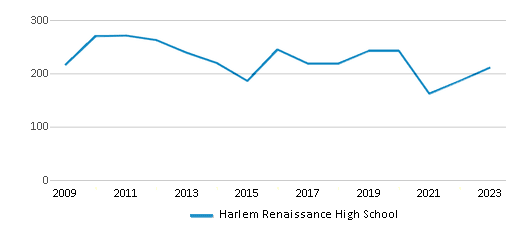
Gender %
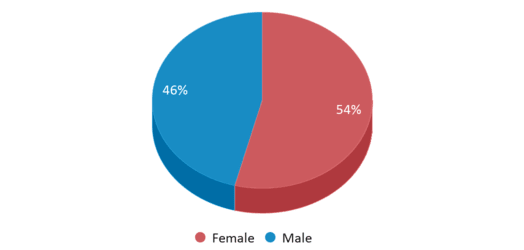
Total Classroom Teachers
16 teachers
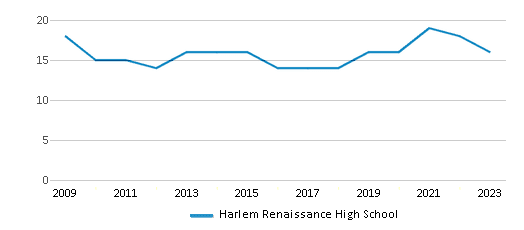
Students by Grade
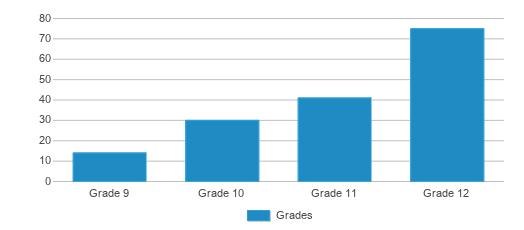
School Rankings
Harlem Renaissance High School ranks within the bottom 50% of all 4,377 schools in New York (based off of combined math and reading proficiency testing data).
The diversity score of Harlem Renaissance High School is 0.50, which is less than the diversity score at state average of 0.72. The school's diversity has stayed relatively flat over five school years.
Overall Testing Rank
#2549 out of 4377 schools
(Bottom 50%)
(Bottom 50%)
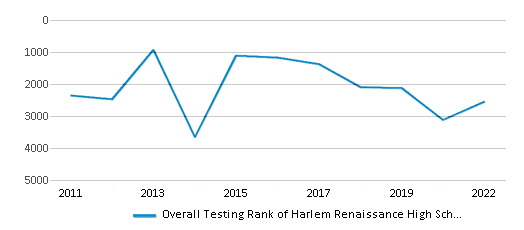
Math Test Scores (% Proficient)
21-39%
46%
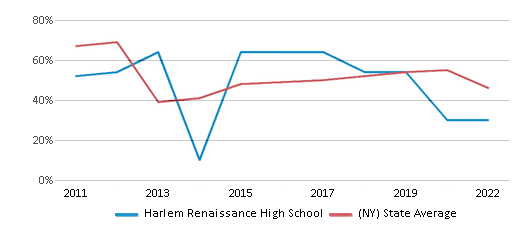
Reading/Language Arts Test Scores (% Proficient)
≥50%
49%
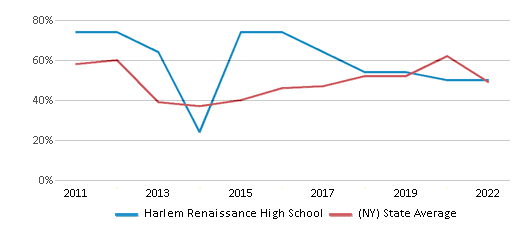
Science Test Scores (% Proficient)
60-79%
78%
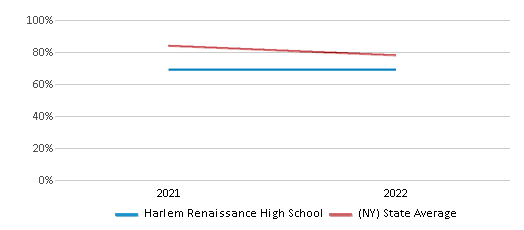
Student : Teacher Ratio
10:1
11:1
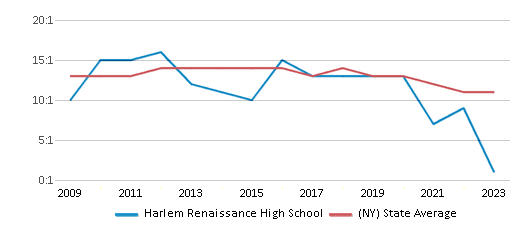
American Indian
1%
1%
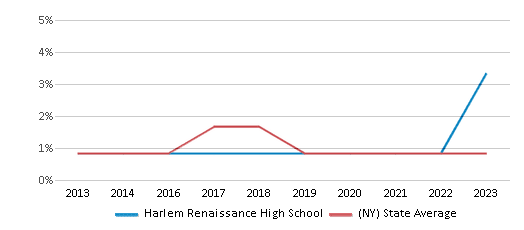
Asian
n/a
10%
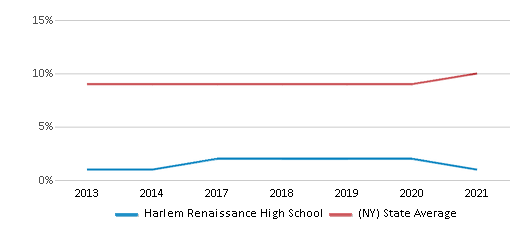
Hispanic
37%
30%
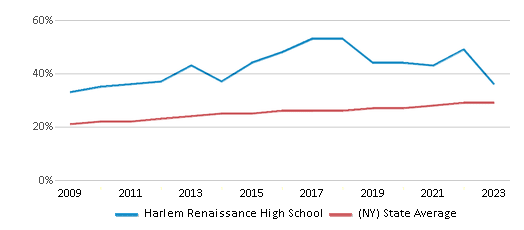
Black
61%
16%
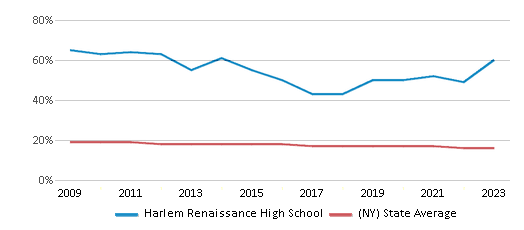
White
1%
40%
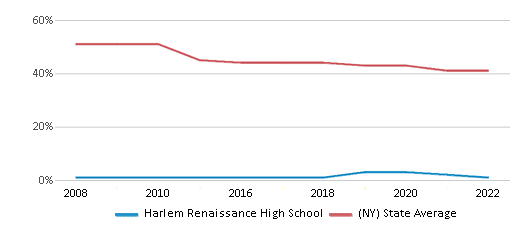
Hawaiian
n/a
n/a
Two or more races
n/a
3%
All Ethnic Groups
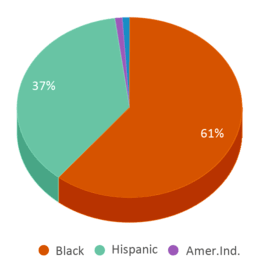
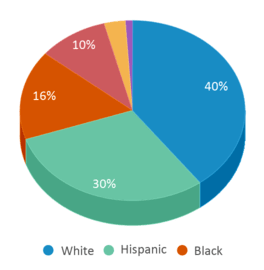
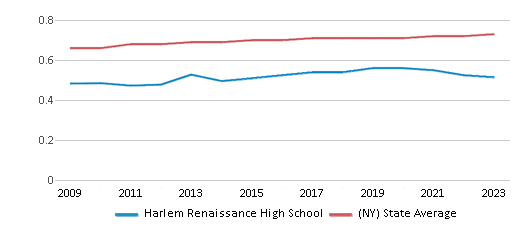
Graduation Rate
15-19%
87%
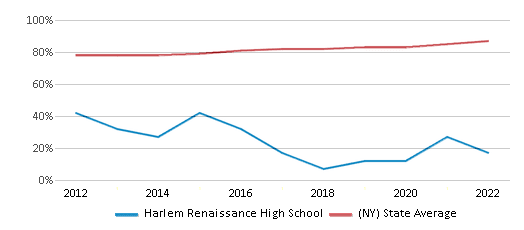
Participates in the National School Lunch Program (NSLP)
Yes
Eligible for Free Lunch
85%
54%
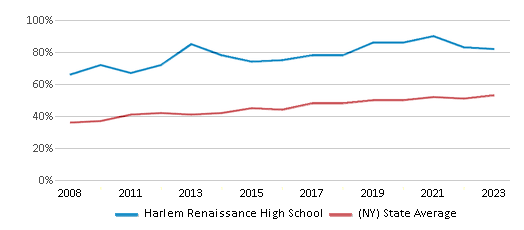
Eligible for Reduced Lunch
1%
3%
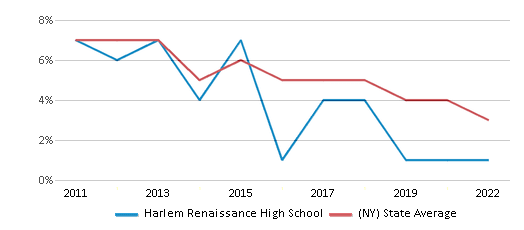
School Statewide Testing
School District Name
Source: National Center for Education Statistics (NCES), NY Dept. of Education
Profile last updated: 02/09/2025
Frequently Asked Questions
What is Harlem Renaissance High School's ranking?
Harlem Renaissance High School is ranked #2549 out of 4,377 schools, which ranks it among the bottom 50% of public schools in New York.
What percent of students have achieved state testing proficiency in math and reading?
21-39% of students have achieved math proficiency (compared to the 46% NY state average), while ≥50% of students have achieved reading proficiency (compared to the 49% NY state average).
What is the graduation rate of Harlem Renaissance High School?
The graduation rate of Harlem Renaissance High School is 15-19%, which is lower than the New York state average of 87%.
How many students attend Harlem Renaissance High School?
160 students attend Harlem Renaissance High School.
What is the racial composition of the student body?
61% of Harlem Renaissance High School students are Black, 37% of students are Hispanic, 1% of students are American Indian, and 1% of students are White.
What is the student:teacher ratio of Harlem Renaissance High School?
Harlem Renaissance High School has a student ration of 10:1, which is lower than the New York state average of 11:1.
What grades does Harlem Renaissance High School offer ?
Harlem Renaissance High School offers enrollment in grades 9-12 (offers virtual instruction).
What school district is Harlem Renaissance High School part of?
Harlem Renaissance High School is part of New York City Geographic District # 5 School District.
School Reviews
2 7/6/2015
Honestly this school doesn't even deserve that 1 star- this school is awful and I would not recommend it to anyone ! Poor attendance! everyone is constantly grouchy, staff is ALWAYS nagging about minor BS such as Whereabouts even when you have PERMISSION. It's such an uncomfortable environment for me. I've attended 2 other high schools prior to this one and Harlem Rennsiaance is by far The worst experience I've ever endured in my 4 years of HS. there is NO MUTUAL RESPECT amoungs students, staff and let's not forget staff vs students. No organization what's so ever - This school is flat out ghetto. BEWARE IF YOU PLAN ON ATTENDED THIS SCHOOL!!!!!!!!
Review Harlem Renaissance High School. Reviews should be a few sentences in length. Please include any comments on:
- Quality of academic programs, teachers, and facilities
- Availability of music, art, sports and other extracurricular activities
Recent Articles

What Is A Charter School?
Explore the world of charter schools in this comprehensive guide. Learn about their history, how they operate, and the pros and cons of this educational innovation. Discover key facts about charter schools, including admission policies, demographics, and funding, as well as what to look for when considering a charter school for your child.

10 Reasons Why High School Sports Benefit Students
Discover the 10 compelling reasons why high school sports are beneficial for students. This comprehensive article explores how athletics enhance academic performance, foster personal growth, and develop crucial life skills. From improved fitness and time management to leadership development and community representation, learn why participating in high school sports can be a game-changer for students' overall success and well-being.

February 05, 2025
Understanding the U.S. Department of Education: Structure, Impact, and EvolutionWe explore how the Department of Education shapes American education, from its cabinet-level leadership to its impact on millions of students, written for general audiences seeking clarity on this vital institution.









